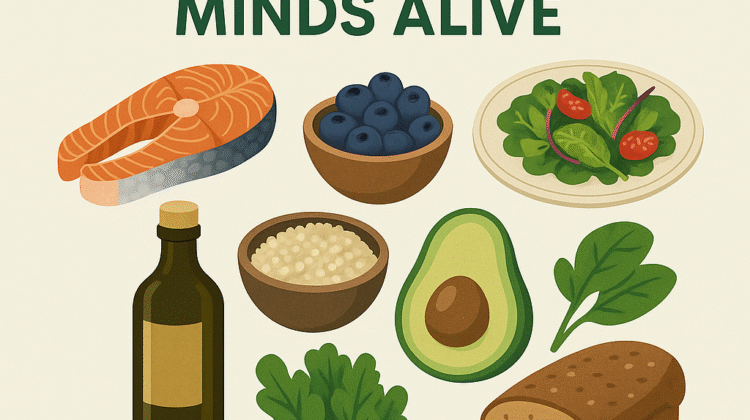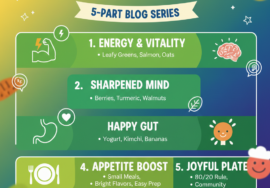
The Best Diets to Support Dementia and Alzheimer’s Patients: Keeping Minds Alive and Sharp
Table of Contents
- Introduction: Why Diet Matters in Dementia and Alzheimer’s Care
- The Mediterranean Diet and Cognitive Health
- The MIND Diet: A Research-Backed Hybrid Approach
- The Role of Omega-3 Fatty Acids and Brain-Boosting Nutrients
- Foods to Avoid for Better Brain Function
- Hydration and Its Impact on Cognitive Sharpness
- Local Meal Planning Ideas for Katy, TX Families and Caregivers
- Conclusion and Community Resources
Introduction: Why Diet Matters in Dementia and Alzheimer’s Care
Nutrition is one of the most overlooked but powerful tools in caring for people with dementia and Alzheimer’s disease. While there is currently no cure for these conditions, decades of research show that diet can play a significant role in slowing cognitive decline, improving memory retention, and supporting overall quality of life. Families searching for assisted living in Katy, TX often ask how food and daily meals impact brain health, because what a resident eats every day directly influences how alert, engaged, and comfortable they feel.
The brain is an energy-hungry organ. It consumes about 20 percent of the body’s daily calories, which means that fuel quality matters. Diets high in processed foods, added sugars, and unhealthy fats can accelerate inflammation and oxidative stress in the brain. Over time, this can contribute to memory loss, confusion, and faster progression of Alzheimer’s symptoms. On the other hand, nutrient-dense foods filled with antioxidants, vitamins, and healthy fats can protect brain cells, improve communication between neurons, and support sharper thinking.
Caregivers and families face an ongoing challenge: balancing meals that are nutritious, appealing, and easy to consume for residents who may struggle with chewing, swallowing, or appetite changes. This is why communities like Evergreen Cottages in Katy, TX pay careful attention to meal planning. The goal is not only to meet daily nutrition requirements but also to promote brain resilience through intentional food choices.
Recent studies highlight that certain eating patterns, such as the Mediterranean diet and the MIND diet, are associated with lower rates of cognitive decline and even delayed onset of Alzheimer’s symptoms. These diets emphasize whole foods, lean proteins, fruits, vegetables, nuts, and omega-3 fatty acids that actively nourish brain cells. Importantly, they are sustainable and adaptable for senior living communities, meaning residents can enjoy meals that
The Mediterranean Diet and Cognitive Health
The Mediterranean diet has been studied for decades as one of the healthiest eating patterns in the world. Originally based on the traditional diets of Greece, Italy, and surrounding regions, this way of eating emphasizes whole foods, fresh produce, and healthy fats. Researchers have consistently found that individuals who follow the Mediterranean diet experience slower rates of cognitive decline, reduced risk of Alzheimer’s disease, and better overall brain function.
Key Components of the Mediterranean Diet
- Fruits and Vegetables: A daily variety of colorful produce provides antioxidants that protect brain cells from oxidative damage. Leafy greens, berries, and cruciferous vegetables like broccoli are especially protective.
- Whole Grains: Foods such as oats, brown rice, quinoa, and barley release energy slowly, keeping blood sugar stable and preventing spikes that can damage blood vessels in the brain.
- Healthy Fats: Olive oil is a central part of this diet, supplying monounsaturated fats that improve blood flow and reduce inflammation. Nuts, seeds, and avocados also provide these protective fats.
- Lean Proteins: Fish, especially salmon, sardines, and trout, are rich in omega-3 fatty acids that support communication between neurons. Poultry and legumes are also recommended sources of protein.
- Limited Red Meat and Processed Foods: Red meat, processed meats, and refined sugars are minimized because they contribute to inflammation and oxidative stress.
- Moderate Dairy and Wine: Yogurt, cheese, and a glass of red wine with meals are common in Mediterranean regions, but moderation is key.
How It Supports Brain Function
The Mediterranean diet is rich in polyphenols, flavonoids, and omega-3s, which protect neurons from degeneration. These compounds strengthen synaptic plasticity, the brain’s ability to adapt and form new connections. Studies have shown that seniors adhering closely to this diet demonstrate better memory performance and executive function compared to those eating more processed foods.
Another advantage is that this diet supports cardiovascular health, which directly impacts brain function. Good circulation ensures that brain cells receive oxygen and nutrients consistently. Since Alzheimer’s and dementia are often associated with reduced blood flow to certain areas of the brain, the Mediterranean diet provides a protective buffer.
Practical Applications in Senior Living Communities
At Evergreen Cottages in Katy, TX, implementing elements of the Mediterranean diet can be achieved through simple daily changes:
- Serving grilled salmon or baked trout instead of fried meats.
- Offering olive oil dressings and avocado spreads in place of heavy sauces.
- Preparing fresh fruit bowls with berries, apples, and oranges for snacks.
- Using whole grain bread and pasta in resident meals.
By consistently weaving these foods into everyday dining, caregivers and chefs can promote better brain health and overall vitality in residents with dementia and Alzheimer’s disease.
The MIND Diet: A Research-Backed Hybrid Approach
The MIND diet, short for “Mediterranean-DASH Diet Intervention for Neurodegenerative Delay,” was designed specifically to protect the brain and reduce the risk of Alzheimer’s disease. It combines the best elements of the Mediterranean diet with the DASH diet, which is traditionally used to lower high blood pressure. Together, they create a nutritional framework focused on slowing cognitive decline and maintaining sharpness as people age.
The Science Behind the MIND Diet
Multiple long-term studies have confirmed that seniors who follow the MIND diet closely have a significantly lower risk of developing Alzheimer’s disease. One major study showed that people who adhered strictly to the MIND diet had a 53 percent reduced risk, while even moderate adherence lowered risk by 35 percent. Unlike other general diets, the MIND diet was built around foods with direct evidence for improving memory and protecting brain health.
Core Foods of the MIND Diet
The MIND diet outlines 10 food groups to include regularly and 5 food groups to limit.
Recommended Brain-Boosting Foods:
- Leafy Green Vegetables: At least six servings per week. Spinach, kale, and collard greens are rich in folate, vitamin K, and antioxidants that support memory.
- Other Vegetables: One or more servings daily, with an emphasis on colorful, seasonal options.
- Berries: At least twice per week. Blueberries and strawberries are especially noted for slowing cognitive aging.
- Nuts: Five servings per week. Walnuts and almonds provide healthy fats and vitamin E.
- Olive Oil: The primary oil for cooking and dressings.
- Whole Grains: At least three servings daily. Whole wheat bread, oatmeal, quinoa, and brown rice stabilize blood sugar and provide fiber.
- Fish: At least once per week, with an emphasis on fatty fish like salmon or sardines.
- Poultry: Twice per week, replacing heavier red meats.
- Beans and Legumes: At least four servings per week. Lentils, black beans, and chickpeas offer plant-based protein and fiber.
- Wine: One glass per day, optional and not recommended for everyone.
Foods to Limit:
- Butter and margarine (less than one tablespoon per day).
- Cheese (no more than one serving per week).
- Red meat (fewer than four servings per week).
- Fried foods and fast food (less than once per week).
- Pastries, sweets, and processed desserts (occasional, not daily).
Why the MIND Diet Works
The MIND diet is powerful because it focuses on nutrient density and reduces harmful fats and sugars that contribute to vascular problems in the brain. By lowering inflammation and promoting steady blood flow, it helps protect neurons from damage. The emphasis on berries and leafy greens provides targeted antioxidants proven to delay age-related memory loss.
Implementing the MIND Diet at Evergreen Cottages
For communities in Katy, TX, the MIND diet offers a flexible template that can be adapted to residents’ preferences. Examples include:
- Serving berry parfaits with low-sugar yogurt for breakfast.
- Preparing lentil soups and bean stews for warm, nutrient-dense meals.
- Offering poultry dishes with side salads of kale or spinach.
- Substituting butter with olive oil spreads during mealtimes.
Families searching for assisted living in Katy, TX should feel confident knowing that dietary patterns like the MIND diet can directly support their loved one’s memory, mood, and daily vitality.
The Role of Omega-3 Fatty Acids and Brain-Boosting Nutrients
Beyond broad dietary patterns like the Mediterranean and MIND diets, certain nutrients stand out for their direct impact on memory, brain performance, and overall neurological resilience. For dementia and Alzheimer’s patients, these nutrients can make the difference between cognitive decline progressing quickly or being slowed down significantly.
Omega-3 Fatty Acids: The Brain’s Essential Fat
Omega-3 fatty acids are one of the most important nutrients for brain health. Found in fatty fish like salmon, sardines, and mackerel, these fats are integral to maintaining the structure of brain cell membranes. They also reduce inflammation, which plays a role in Alzheimer’s progression.
Research shows that higher omega-3 intake is linked with better memory recall and reduced brain shrinkage in aging populations. In fact, seniors with dementia who consumed omega-3-rich diets displayed slower functional decline compared to those with lower intake.
Sources of Omega-3s for Dementia Support:
- Salmon, sardines, trout, and mackerel.
- Chia seeds, flaxseeds, and walnuts.
- Fortified eggs and certain dairy products.
For residents at Evergreen Cottages in Katy, TX, chefs can introduce omega-3s by incorporating salmon patties, walnut-topped oatmeal, or flaxseed muffins into meal plans.
Antioxidants and Polyphenols
Oxidative stress is a leading factor in the progression of dementia. Antioxidants neutralize harmful free radicals, protecting neurons from damage. Foods high in antioxidants include:
- Blueberries, blackberries, and strawberries.
- Dark chocolate with high cocoa content.
- Green tea, rich in polyphenols.
- Vegetables like kale, spinach, and red peppers.
By serving antioxidant-rich snacks and beverages daily, caregivers help reduce cellular stress and preserve mental sharpness.
B Vitamins and Folate
B vitamins, especially B6, B12, and folate, support neurotransmitter production and regulate homocysteine levels. Elevated homocysteine is linked to increased risk of dementia and stroke. Seniors often struggle with vitamin B12 absorption, so supplementation or fortified foods may be necessary.
Key Sources:
- Leafy greens such as spinach and romaine lettuce.
- Eggs and poultry.
- Fortified cereals and nutritional yeast.
Vitamin D and Cognitive Decline
Vitamin D deficiency is common in older adults and has been associated with faster cognitive decline. Sunlight exposure is the most natural source, but diet also plays a role. Fatty fish, fortified dairy, and mushrooms provide valuable Vitamin D. In senior living communities, ensuring safe outdoor time combined with nutrient-rich foods helps maintain healthy levels.
Hydration and Electrolytes
Dehydration can mimic or worsen dementia symptoms such as confusion, irritability, and fatigue. Seniors are at higher risk due to reduced thirst perception. Offering flavored water with lemon or cucumber, low-sodium broths, and hydrating fruits like watermelon can help maintain hydration and cognitive clarity.
Local Relevance for Katy, TX Families
For families exploring assisted living in Katy, TX, ensuring access to meals filled with omega-3s, antioxidants, and essential vitamins is critical. Communities like Evergreen Cottages emphasize balanced nutrition because these nutrients not only keep the body strong but also sustain the brain’s ability to engage in conversation, recognize loved ones, and remain present in daily activities.
Foods to Avoid for Better Brain Function
Just as some foods strengthen the brain, others can accelerate decline and worsen symptoms in dementia and Alzheimer’s patients. Reducing or eliminating these items from daily diets is just as important as adding beneficial foods.
Harmful Foods for Cognitive Health:
- Processed Sugars: Candy, soda, pastries, and sugary cereals spike blood sugar and fuel inflammation in the brain.
- Fried Foods and Trans Fats: Fast food, packaged snacks, and fried meals damage blood vessels and contribute to plaque buildup in the brain.
- Refined Carbohydrates: White bread, pasta, and rice cause blood sugar fluctuations that can impair memory.
- High-Sodium Foods: Processed deli meats, canned soups, and packaged meals contribute to high blood pressure, which reduces blood flow to the brain.
- Excessive Red Meat and Cheese: Heavy saturated fats accelerate cognitive decline if consumed too often.
In communities like Evergreen Cottages in Katy, TX, meals are carefully crafted to reduce these risks by limiting processed foods and providing balanced, home-style cooking.
Local Meal Planning Ideas for Katy, TX Families and Caregivers
Supporting a loved one with dementia at home or in an assisted living community requires thoughtful meal planning. Here are practical ways to incorporate brain-boosting diets while keeping meals enjoyable:
- Prepare weekly menus that rotate between Mediterranean and MIND diet staples.
- Include fish-based dinners twice per week, using salmon, tilapia, or local Gulf seafood available in Texas markets.
- Replace sugary desserts with fresh fruit parfaits, berry bowls, or lightly sweetened baked apples.
- Use olive oil in everyday cooking, from sautéing vegetables to drizzling over salads.
- Prepare hydration-friendly snacks like watermelon cubes, cucumber slices, or homemade soups with low sodium.
- Create simple one-pot meals like lentil soup, quinoa with vegetables, or bean chili that are easy to eat and nutrient dense.
Families searching for memory care or assisted living in Katy, TX should ask communities how they implement these strategies daily. Nutrition is not just about calories but about quality, and Evergreen Cottages integrates these principles into its dining programs.
Local SEO FAQ: Dementia, Diet, and Assisted Living in Katy, TX
What is the best diet for seniors with dementia in Katy, TX assisted living communities?
The best diets for dementia are the Mediterranean and MIND diets. Communities like Evergreen Cottages in Katy, TX incorporate foods rich in omega-3s, leafy greens, whole grains, and berries to help slow cognitive decline and support resident vitality.
Can certain foods slow down Alzheimer’s progression?
Yes. Foods rich in antioxidants, omega-3 fatty acids, and vitamins such as B12 and D can help slow the progression of Alzheimer’s symptoms. Regular intake of salmon, walnuts, blueberries, and leafy greens are highly recommended.
Are there foods dementia patients should avoid?
Yes. Foods high in processed sugars, fried fats, refined carbs, and heavy sodium should be limited. These contribute to inflammation and reduced brain function. Assisted living communities in Katy, TX help residents avoid these harmful foods through intentional meal planning.
How do Evergreen Cottages in Katy, TX design meals for memory care residents?
Evergreen Cottages designs meals around research-backed diets that improve memory health. Residents enjoy meals with whole grains, lean proteins, fresh vegetables, and hydration-friendly snacks while limiting processed foods.
Do assisted living residents in Katy, TX receive meals with omega-3s?
Yes. Omega-3-rich meals are a priority, including salmon dishes, walnut toppings, and chia seed-based recipes that support memory health.
How does hydration affect dementia patients?
Hydration is critical. Even mild dehydration can cause confusion and worsen dementia symptoms. Assisted living communities in Katy, TX provide flavored water, soups, and fresh fruits to help residents maintain hydration.
Can families request specific diet plans at Evergreen Cottages?
Yes. Families can work with caregivers and chefs to adapt meals around specific dietary needs, including Mediterranean and MIND diet preferences.
What makes Evergreen Cottages unique in their approach to brain health and diet?
Evergreen Cottages integrates proven dietary strategies, personalizes meal planning, and emphasizes fresh, whole ingredients to give residents the best chance of maintaining memory and quality of life.



